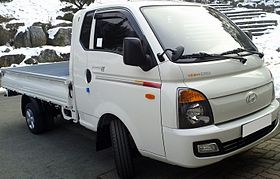Hyundai Porter
This article needs additional citations for verification. (September 2013) |
| Hyundai Porter | |
|---|---|
 | |
| Overview | |
| Manufacturer | Hyundai |
| Also called | Hyundai H-100 JAC Shuailing X |
| Production | 1977–present |
| Model years | 1977–1981 1986–1996 1996–2004 2004–present |
| Assembly | Ulsan, South Korea |
| Body and chassis | |
| Layout | FR layout F4 layout |
| Related | Kia Bongo |
The Hyundai Porter (Hangul:현대 포터), also known as the Hyundai H-100, is a cabover truck produced by the South Korean manufacturer Hyundai since 1977.[1]
History
First generation (1977–1981)
The first generation, launched in January 1977, was called the Hyundai HD1000 and was available in both truck and minibus (3 and 12-seater van, ambulance) versions. The truck was called the Porter. The HD1000 was discontinued in 1981.
Second generation (1986–1996)

In November 1986, Hyundai revived the label with the introduction of the second generation Porter, which was now a rebadged licensed second generation Mitsubishi Delica (L300). While the third generation Delica was also built by Hyundai, it was known as the Grace and was marketed only as a van, in parallel with the Porter truck range. It was built with the following body styles: 2-door truck, 4-door truck, 3-door van and 4-door van.
Upgrade

The upgraded second generation was a facelifted version of the second generation model. Round headlights, a steering wheel from the 1991 Sonata, and the dashboard from the newer Grace, were the main differences. In The Netherlands, it was called Hyundai H150.
The 1993 Porter was available with a regular cab, an extended cab, or a double cab. The four-cylinder engine was called the Cyclone D4BX,[2] a Hyundai built version of Mitsubishi's 4D56 2.5 liter diesel four-cylinder.
Third generation (1996–2004)

The third generation, called the New Porter that called in upgraded version of 2nd generation Porter, was launched in March 1996. It was built with the following body styles: 2-door truck, 4-door truck, 3-door van and 4-door van. In South Africa, it was known as the Hyundai Bakkie. In The Netherlands, it was called Hyundai H150. In Malaysia, it was known as Inokom AU26. In Pakistan, it was called Hyundai Shehzore.
Fourth generation (2004–present)
| Hyundai Porter 2004–present | |
|---|---|
 Hyundai Porter II, "Super Cab" model with extended wheelbase and A2 CRDi turbodiesel engine. | |
| Overview | |
| Manufacturer | Hyundai |
| Also called | Hyundai H-100 |
| Production | 2004–present |
| Assembly | Ulsan, South Korea |
| Body and chassis | |
| Layout | FR layout |
| Powertrain | |
| Engine | 2.6L T2 I4 CRDi (diesel) 2.5L A2 I4 CRDi Turbo (diesel) |
| Transmission | 5-speed manual (T2 engine) 6-speed manual (A2 engine) |
| Dimensions | |
| Wheelbase | 2,430 mm (95.7 in) or 2,640 mm (103.9 in) |
| Length | 4,810–5,175 mm (189.4–203.7 in) |
| Width | 1,740 mm (68.5 in) |
| Height | 1,970 mm (77.6 in) |
| Curb weight | 1,620–1,794 kg (3,571–3,955 lb) |

The fourth generation is called the Porter II. In South Korea, it is available as either a single-cabin, extended-cabin or a double-cabin model. The single-cab model is available with a choice of two wheelbases, 2,430 mm (95.7 in) or 2,640 mm (103.9 in); the extended-cab is limited to the longer wheelbase; and the double-cab is limited to the shorter wheelbase.[3]
There is also a choice of two engines: a T2 (D4BB) 2.6-litre inline-four, common rail diesel engine, which develops a maximum power of 79 PS (58 kW) at 4,000 rpm and a maximum torque of 17 kg⋅m (123 lb⋅ft) at 2,200 rpm; or an A2 2.5-litre I4 common rail turbo diesel engine which develops a maximum power of 130 PS (96 kW) at 3,800 rpm and a maximum torque of 26 kg⋅m (188 lb⋅ft) from 1,500–3,500 rpm.
In 2016, the Porter was the best-selling vehicle in South Korea, with 44,696 vehicles delivered domestically through May 2016 (compared to 39,779 units of the Hyundai Avante in the same period).[4] Globally, Hyundai sold 99,743 Porters in 2015.[4]
Local names
| Country | Assembled | Make | Model | Since |
|---|---|---|---|---|
| South Korea | Ulsan | Hyundai | H-100 Porter | 1977 |
| Brazil | Anápolis | Hyundai | HR | |
| Libya | Hyundai | Dragonfly | ||
| Malaysia | Kulim | Inokom | Lorimas AU26 | |
| Mexico | Dodge | H-100 | ||
| Pakistan | Hyundai | Shehzore | [a] | |
| Russia | Yes[b] | Hyundai | Porter | |
| South Africa | H100 | Hyundai | Bakkie[c] | 1997 |
| Vietnam | Ho Chi Minh City | Thaco | Frontier, K190[8] |
Notes
See also
References
- ^ "About: Hyundai Porter". Hyundai Porter. Retrieved 2008-08-22.
- ^ "Porter 93". TradeKOREA.com. KITA (Korea International Trade Association). Retrieved 2011-08-14.
- ^ "Hyundai H100 (Worldwide)". Hyundai Worldwide. 2016. Archived from the original on 3 November 2016. Retrieved 3 November 2016.
{{cite web}}: Unknown parameter|deadurl=ignored (|url-status=suggested) (help) - ^ a b Courtenay, Vince (23 June 2016). "Hyundai Not Tooting Horn Over Hot-Selling Porter". Ward's Auto. Retrieved 3 November 2016.
- ^ "Dewan Farooque applies for resuming car production". The Express Tribune. 11 August 2016. Retrieved 3 November 2016.
- ^ Courtenay, Vince (29 May 2008). "Hyundai Set to Break Ground on Russian Plant". Ward's Auto. Retrieved 3 November 2016.
- ^ "New Hyundai Tipper Right For the Job". TruckWatch. Johannesburg, South Africa: FleetWatch Magazine. 2003. Retrieved 2011-08-14.
- ^ http://www.thacotrucks.vn/san-pham/Default.aspx?BrandID=3
External links
- Official website(English)
